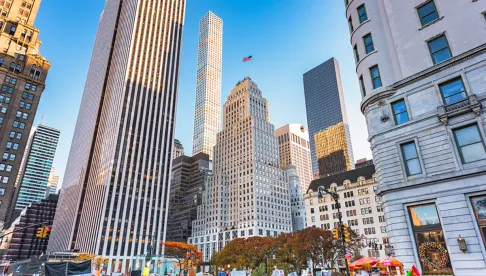On April 9, 2020, Empire State Development (“ESD”) released updated guidance for determining whether a business or service is “essential” under recent executive orders issued by New York Governor Andrew Cuomo. These orders, which we addressed in a previous post, require that only businesses and not-for-profit entities deemed essential (or that provide essential services) utilize an in-person workforce, and only to the extent necessary to support or provide such essential business or service. In addition, all businesses – including those deemed essential – must utilize teleworking arrangements and maintain social distancing to the greatest extent possible.
The primary changes in this round of guidance are: (1) the addition of certain recreation and professional services as categories of essential businesses, (2) an addition to essential retail to allow for one employee to be present in retail stores to fulfil online and telephone orders, and (3) an addition to essential services to allow for certain animal care services, landscaping, marketing, and remote or streaming fitness classes.
The following are now considered “essential” and are thus exempt from the Order:
-
Essential health care operations – including research and laboratory services; hospitals; walk-in health care clinic and facilities; emergency veterinary and livestock services; senior/elder care; medical wholesale and distribution; home health care workers or aides for the elderly; doctor and emergency dental offices; nursing homes and similar facilities; medical supplies and equipment manufacturers and providers; licensed mental health and substance abuse treatment providers; medical billing staff; emergency chiropractic services; and physical/occupational therapy prescribed by a medical professional.
-
Essential infrastructure – including public and private utilities such as power generation and fuel supply; public water and wastewater; telecommunications and data centers; airports/airlines; commercial shipping vessels/ports and seaports; transportation infrastructure such as bus, rail, for-hire vehicles, and garages; and hotels and places of accommodation.
-
Essential manufacturing – including food processing, manufacturing agents including all foods and beverages; chemicals; medical equipment/instruments; pharmaceuticals; sanitary products including personal care products regulated by the FDA; telecommunications; microelectronics/semi-conductor; food-producing agriculture/farms; household paper products; defense industry and transportation infrastructure; automobiles; and any parts or components necessary for essential products in this guidance.
-
Essential retail – including grocery stores; all food and beverage stores; pharmacies; convenience stores; farmer’s markets; gas stations; restaurants and bars for take-out and delivery only; pet food; hardware, appliance, and building material stores; telecommunications to service existing customers and accounts; and delivery for orders placed remotely at non-essential retail establishments, provided that only one employee is physically present at the business location.
-
Essential services – including trash and recycling services; mail and shipping services; laundromats and other clothing/fabric cleaning services; building cleaning and maintenance; child care services; auto and bicycle repair; limited automotive sales conducted remotely or electronically; certain marine vessel repair and marinas; warehouse distribution and fulfillment; funeral homes; crematoriums; cemeteries; storage for essential businesses; maintenance for the infrastructure of the facility or to maintain or safeguard materials or products therein; animal shelters and animal care including dog walking and animal boarding; landscaping for maintenance or pest control and not cosmetic services; designing, printing, publishing, and signage companies to the extent that they support essential businesses or services; and certain remote instruction or streaming of school or fitness classes.
-
News media.
-
Financial institutions – including banks; lending institutions; insurance; payroll; accounting; and services related to financial markets, except debt collection.
-
Providers of basic necessities to economically disadvantaged populations – including homeless shelters; congregate care facilities; food banks; and other human service providers.
-
Construction – which includes only: (a) emergency construction; and (b) essential construction. More information on permissible construction is available at the above guidance and, for New York City employers, on the Department of Buildings website.
-
Defense and national security-related operations.
-
Essential services necessary to maintain the safety, sanitation and essential operations of residences or other businesses – including law enforcement such as corrections and community supervision; fire prevention and response; building code enforcement; security; emergency management and response, EMS and 911 dispatch; building cleaners or janitors; general maintenance; auto repair; disinfection; and residential moving services.
-
Vendors that provide essential services or products– including logistics; technology support for online services; child care programs and services; government owned or leased buildings; essential government services; and any personnel necessary for on-line or distance learning or classes delivered via remote means.
-
Recreation – including parks and other open public spaces, except playgrounds and other areas of congregation where social distancing cannot be abided; and not including both golf courses and boat launches and marinas for recreational vehicles.
-
Professional services with extensive restrictions – including lawyers who may continue to perform all essential work remotely, but any in-person work shall be limited to work in support of essential businesses or services and only to the extent that remote work is not possible; and real estate services, which should be conducted remotely, except that any services and parts therein may be conducted in-person only to the extent legally necessary and in accordance with appropriate social distancing and disinfection protocols; and not brokerage and branch offices for service to the general public.
According to a question and answer document accompanying the guidance, not all employees are permitted to work at an essential business location. Rather, only those that are needed to provide the essential product or service are permitted to be present. On the other hand, non-essential businesses that are a vendor, supplier, or provider of other support to an essential business are permitted to have an in-person workforce to the extent necessary to support the essential business, subject to the usual teleworking and social distancing requirements. The document also clarifies that non-essential businesses are able to send a single person into the office to perform certain tasks, such as picking up mail, so long as they will not be in contact with others.
As was the case before, an employer may request a designation as an essential business on the state’s website. However, the new guidance now includes a list of business that are deemed non-essential, and are therefore unable to request an essential designation. These businesses include, among others:
-
Theatres and event venues, including those that host concerts and performances.
-
Facilities that conduct video lottery or casino gaming.
-
Gyms, fitness centers, and exercise classes, except those conducted remotely.
-
Indoor common portions of large shopping malls.
-
All places of public amusement, including amusement parks, carnivals, water parks, and bowling alleys.
-
Barbershops, hair salons, tattoo and piercing parlors, and certain other personal care services.
At this time, it remains unclear when the state will begin to scale back these orders. On April 7, the Governor announced that the in-person workforce restrictions will be effective until at least 11:59 PM on Wednesday, April 29, 2020, unless further extended by a future Executive Order. Our team is closely monitoring these orders and will continue to provide updates as they become available.





 />i
/>i

